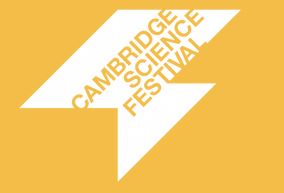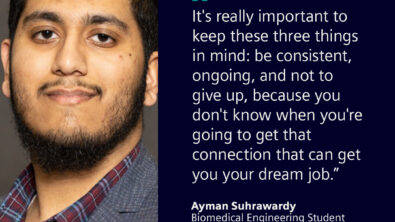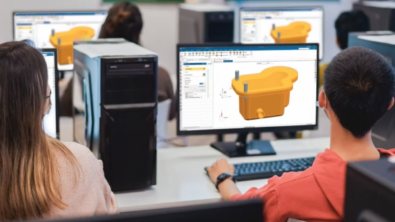Digital Twins – inspiring the next generation of engineers!

What better way to encourage kids to follow careers in STEM (Science, Technology, Engineering & Maths), than showing them all the cool stuff our customers design & manufacture using our solutions? That’s exactly what our dynamic duo Hugh Newsam & Jon Rimmer did at the Cambridge Science Festival!
On a wet Wednesday evening in Cambridge an audience of around 100 ranging from the age of 12 years+ along with parents, university students and members of the local community came to listen to Hugh and Jon explain what our company does by using the topic of Digital Twins.
The theme of the science festival this year is ‘Big Data’, how we manage the vast amounts of data we collect and generate to increase the understanding of our world which fits so well with our Siemens Industrie 4.0 message.
Using lots of examples but mainly the Bloodhound car, Hugh & Jon talked about how modelling & simulating the car in 3D with our NX software – creating a digital twin of a real-world product is so much faster and efficient than the painstaking process of creating actual physical prototypes. The presentation was interactive, the audience answered questions all the way through, ranging from…’How many words are there in all the Harry Potter books put together?’ Any guesses? to ‘How many parts were there in the first Boeing 777 (first aircraft designed entirely using Computer Aided Design)’ this was to explain the complexity in creating products (answers 1,084,170 & 3 million respectively) to why does the Bloodhound car, which is only going to drive in a straight line, need a steering wheel? The kids were really engaged and gave some great answers (answer…there were many but weather conditions, ground irregularities and get this: transonic airflow!)
Keeping it simple but lively, Hugh explained how as engineers we like to deconstruct the car and expose all the mechanics behind the finished model, he showed examples of how this is done in NX, then Jon went on to explain how you can simulate the effects of airflow and motion digitally. Our technology is complex but using lots of real-world examples and keeping the language appropriate to the age group was a winning formula.
This was the first time Siemens has participated at the Cambridge Science Festival, we hope to do more in the future and hopefully we will be encouraging the next generation of engineering and digital manufacturing talent as we go…
…also I heard a few family members of staff from the Cambridge office at the end of the presentation whispering in hushed tones….’ahhhhhhh now I get what you your company does ![]() – BONUS!
– BONUS!
Click here for more information about our Academic Program






